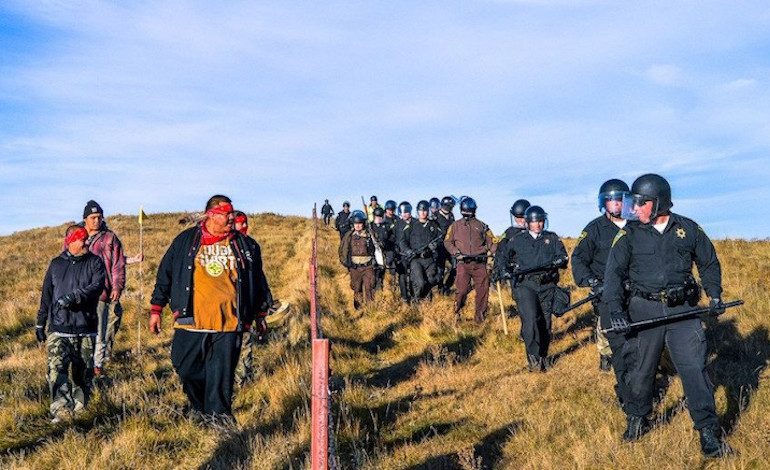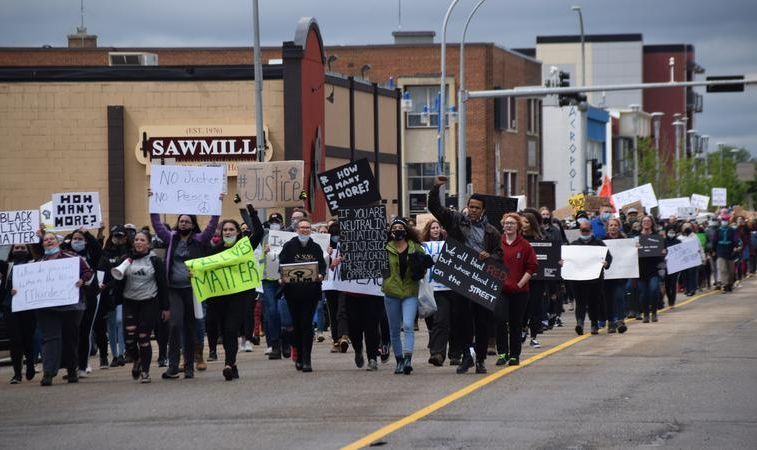Trudeau, Canada’s Liberal Prime Minister, has stated loud and clear his determination to push the Kinder Morgan pipeline through to Vancouver harbour, carrying 890,000 barrels a day of diluted tar sand’s bitumen. The pipeline will feed 400 super tankers, each with a capacity of 120,000 tonnes, a year passing through the harbour. The pipeline will leak and spills are almost certain, threatening the ecology of the land and water. The pipeline will accelerate global warming. Yet increasing climate disasters, including BC’s worst year for forest fires, have no impact on Trudeau.
The election of BC’s new NDP government will boost the resistance to this expensive ecological disaster for BC and the world. The NDP’s election platform stated that it “will use every tool in our toolbox to stop the project.” However, NDP will not delay or refuse permits for Kinder Morgan’s construction, fearful of being sued.
There are 21 court cases objecting to the pipeline on a variety of grounds filed by First Nations and others. BC’s new government has stated it will seek intervener status on the cases, in effect putting its support behind the challenges. It has appointed Thomas Berger, a respected judge who has worked for Indigenous rights, as a legal advisor. The government has also stated that no construction will be allowed on public land, at least until the court cases are over. These are welcome steps.
However, relying on the courts alone is not using “every tool.” The courts do not always defend Indigenous rights, as demonstrated in the courts’ refusal to support the West Moberly and Prophet River First Nations’ objections to the Site C dam. The court cases do provide time to build the solid resistance that can stop the pipeline.
This is a struggle between the federal government on one side and on the other the elected governments in BC – the province, the First Nations and most municipal governments in Metro Vancouver. These, resolutely working together, have the potential to mobilize a movement that will stop the pipeline.
There will be camps and blockades similar to Standing Rock. Already over 21,000 people have signed the Coast Protectors pledge to resist. These blockades must have the full support of elected government at all three levels ensuring supplies, toilets, etc. Elected leaders should be proud to stand on the lines, willing to get arrested. However, there should be no arrests, as the municipalities and the province largely pay for policing, whether city or RCMP, and have a major influence on policy. The agreement between the province of BC and the RCMP states that the RCMP will implement “the provincial policing objectives, priorities and goals as determined by the Provincial Minister.” The municipalities and the province should instruct the RCMP that their “objectives, priorities and goals” are no arrests for non-violent civil disobedience against Kinder Morgan. No doubt, the federal Liberals would object, but there is truth in the phrase that the person who pays the piper calls the tune.
Some of the blockades will be on First Nations’ territories which will pose additional challenges to Federal government intervention. However, Standing Rock did not stop the Dakota Access Pipeline. Trudeau will remove the blockades, even if it alienates the First Nations. Money talks louder to the Liberals than Indigenous rights
A crucial part of resistance is to counter the argument that the pipeline will provide much-needed jobs and boost the Canadian economy. This is especially needed in rural BC, Alberta and across Canada as Trudeau is painting this as BC versus Canada. The resistance has to spread beyond Metro Vancouver, across the country and beyond. While the pipeline will provide construction jobs for two years, the same money, $7.4 billion and rising, used to build homes, insulate buildings and provide renewable energy would provide far more jobs and for the long term. The pipeline will provide only 50 permanent jobs in BC and 40 in Alberta, according to Kinder Morgan, which is probably an exaggeration. A drop in the ocean compared to the thousands of jobs at risk.
Alberta’s job losses are because the price of oil has halved in three years to around $50 a barrel. Trudeau falsely claims that the pipeline would boost the price of tar sand bitumen to near world oil prices. However, the lower price of bitumen is not due to the lack of a pipeline, it is because it costs much more to refine. The pipeline will not provide any significant boost to tar sand’s production, price or jobs. But it will increase climate change. The jobs boosted by the pipeline will be fighting fires, building dikes and dealing with other climate disasters. A sustained campaign needs to explain that idea that Kinder Morgan will provide lasting jobs in Alberta is a pipedream.
If court cases, blockades and persuasion are not enough to stop the pipeline, then economic pressure is necessary. A major oil spill in Vancouver harbour would be devastate jobs and the regional economy – Vancouver would come to a standstill. A spill would cost at least $1.2 billion, excluding clean up. To prevent this huge damage, a one-day organized standstill in Metro Vancouver is entirely appropriate. Imagine if the Union of British Columbia Indian Chiefs, the BC Federation of Labour, the NDP, and the Mayors of Vancouver, Burnaby and other municipalities all called for a one-day shutdown of Metro Vancouver. The economic impact would put huge pressure on Trudeau.
This is a high stakes battle between the fossil fuel industry and the Federal and Alberta governments against virtually all of BC’s people and organizations. Trudeau is willing to lose MPs in Vancouver for this. The campaign needs to ensure the cost of trying to build this pipeline time bomb is much higher than a few Liberal MPs. We have to make the cost so high the government has to retreat from this economic and ecological insanity.




